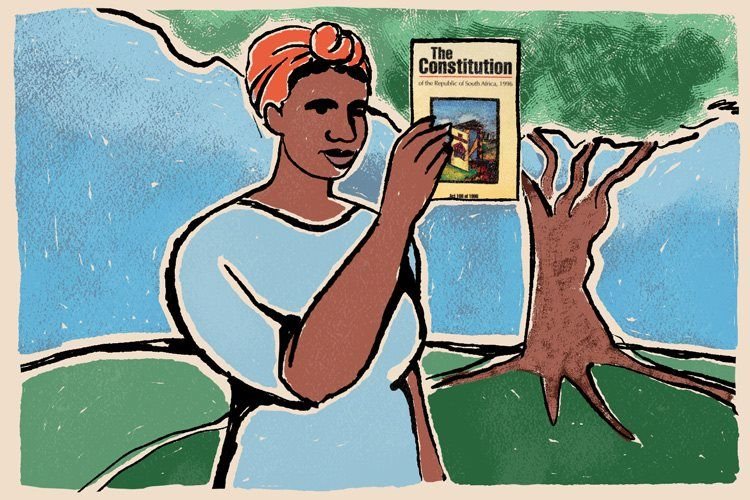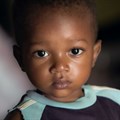Judge says regulation on registration of unwed fathers without documents on children's birth certificates is "irrational" and unconstitutional.

Illustration: Lisa Nelson / GroundUp
- The Eastern Cape High Court in Gqeberha has found a regulation that was stopping undocumented fathers from being registered on their children’s birth certificates unconstitutional.
- The regulation affects the rights of thousands of children simply through the circumstances of their births, Judge Mbulelo Jolwana said.
- He said it was “irrational” and it had never gone through a parliamentary process.
- The rights of citizens cannot be subject to the whims or attitudes of officials in government offices, the judge said.
A regulation preventing the naming of a foreign, unmarried father who is in South Africa illegally on his child’s birth certificate is unconstitutional, the Eastern Cape High Court in Gqeberha has ruled.
Judge Mbulelo Jolwana said the regulation, which provides that a foreign father of a child born out of wedlock must submit a copy of his valid passport, visa, permit, permanent residency, ID document or refugee identity document in order to be registered, was not only irrational but was contrary to the best interest of the child.
It was also at odds with the Births and Deaths Registration Act which imposed no such rule.
The matter before Judge Jolwana was brought by the unmarried biological parents of a young child. The mother is South African. The father is Bulgarian and his visa has expired.
Officials at the Department of Home Affairs refused to register him as the father on his child’s unabridged birth certificate, saying he was no longer legally in the country and because he was not a South African citizen, he had to undergo a paternity test.
The couple launched a court action for an order compelling the department to include the fathers name on the birth certificate and challenging the constitutionality of the relevant regulation.
Judge Jolwana noted that the Minister of Home Affairs had initially opposed the matter, citing the father’s illegal presence in the country and that the regulation “made it impossible” to include the father’s name on the certificate.
During the hearing, his lawyers made a “180 degree turn” and conceded the issues, claiming that the regulation actually did not apply in this matter.
But the couple said the constitutional issue still needed to be aired given that it was a matter of significant public interest.
Lawyers for the minister said that given their capitulation, it was not necessary and the issue was now “moot”.
But Judge Jolwana said they had not explained their earlier stance and their “change of tack” and it called for an explanation.
“It is impossible to appreciate what informed this sudden change and it makes it even difficult to resist the temptation to conclude that the sudden change of mind was in bad faith, designed to cripple and disable the court from enquiring into the constitutionality of the regulation … which continues to bedevil children born in similar circumstances as the child in this matter.
“As can be gleaned from [the minister’s] affidavit, every day in all Department of Home Affairs offices throughout the country, those seeking the registration of their details in the birth records of their children are turned away if their fathers happen to be illegal foreigners,” the judge said, noting that there had been no concession regarding the constitutionality or otherwise of the regulation.
“Rights of citizens cannot be subject to the whims or attitudes of the attending officials in government offices … courts must act when rights, especially the rights of children, are allegedly being undermined.
“The court cannot ignore the fact that there may be literally thousands of other children who are treated no differently from this child, even as we speak … an inquiry into the constitutionality of this regulation is a matter of public importance.”
Judge Jolwana said neither the Constitution nor the Children’s Act distinguished between children on the basis of the citizenship of their parents.
The couple, he said, contended however that the regulation discriminated against their child, who was a South African citizen, because of the circumstances of birth.
In the matter before him, the fact that the father had been unable to renew his visa “has nothing to do with the child and his right to have the identity of his father officially recognised”.
Judge Jolwana said the regulation was “irrational”, noting that it had not gone through any parliamentary process and flew in the face of international instruments dealing with the rights of children.
The Act itself made no distinction between local and foreign fathers – those legally in the country and those that are not.
He declared the regulation to be unconstitutional and ordered the minister to pay the costs on a punitive scale, noting the last-minute about turn.
“For them to force people such as the applicants to approach court, only to admit that they were wrong from the onset, is troubling,” the judge said.
This article was originally published on GroundUp.






























